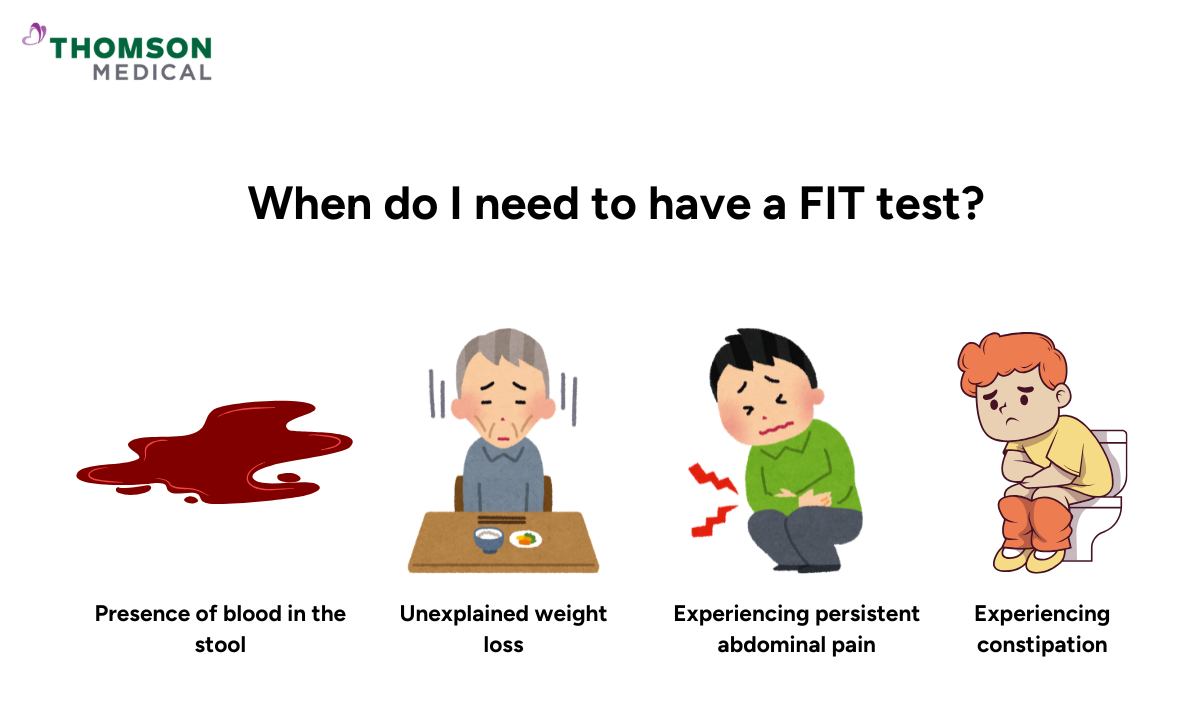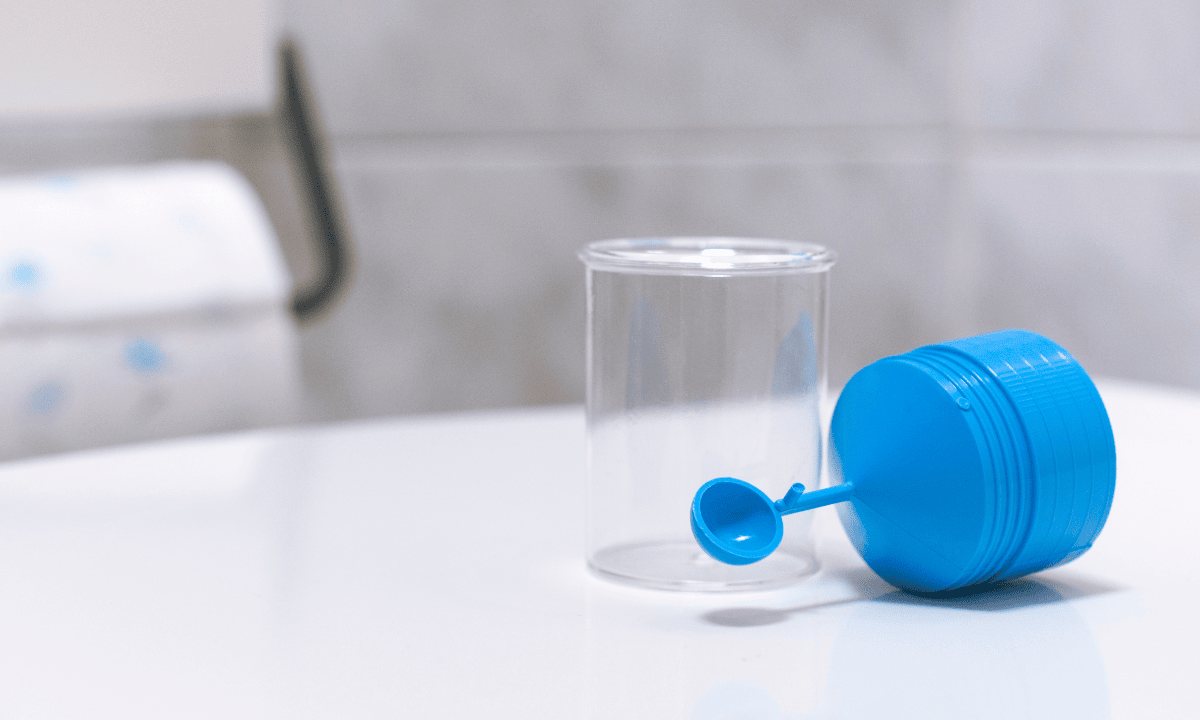What is a faecal immunochemical test?
A Faecal Immunochemical Test (FIT) is an inexpensive and non-invasive screening method that detects hidden blood in the stool. These tiny traces of blood can indicate the presence of colorectal polyps (small clumps of cells that can become cancerous) or cancerous cells in the colon.
This test can help detect these growths at an early stage, when treatment is more likely to work. It can also be performed easily in the comfort of your home, which is why it is often used for routine colorectal cancer screening.
When do I need to have a FIT test?

A FIT test may be performed by your doctor as part of the assessment of your symptoms or if you have risk factors for colorectal cancer. Here are some conditions that may require you to have this screening test:
Aged 50 years or older
Have a family history of colorectal cancer
Have a history of polyps or inflammatory bowel disease (IBD)
For people over 50, even if there are no signs or symptoms of bowel cancer, FIT is still recommended as part of regular health screening at least every one to two years. That's because the risk of bowel cancer increases with age, and early bowel cancer often has no symptoms.
Additionally, you might be recommended to perform this screening test if you experience symptoms of bowel cancer, such as:
Unexplained weight loss
Changes in bowel habits (diarrhea/constipation)
Persistent abdominal pain
Experiencing anaemia
Presence of a lump in the abdomen
If you have any of the risk factors or are experiencing any of the mentioned symptoms, request an appointment with Thomson Medical. Our specialists can assist with further diagnosis, including FIT, to determine the underlying cause of your symptoms and provide a tailored treatment plan.
How to perform the FIT test at home

FIT is a simple stool test you can do at home, so there's no need for any dietary restrictions or special preparation before the test. However, you must remember not to take the test during your period or if you have haemorrhoids, as it can affect the results.
FIT kits are usually provided by your healthcare provider as part of a routine health check. While using a FIT kit to collect a stool sample may seem simple, it must be done correctly to avoid any damage to the stool sample.
Here's how you can do the FIT screening at home:
Write your name and the date of collection on the sample bottle.
To collect your stool, line the toilet bowl with a clean toilet paper to prevent the stool from touching toilet water or urine.
Deposit your stool on the toilet paper.
After having a bowel movement, open the sample bottle by twisting the cap and remove the collection spoon.
Use the collection spoon to take six samples from the inside and outside of the stool.
Place the collection scoop back into the sample bottle and close it tightly.
After collecting the sample, put the used toilet paper in the provided waste bag and wash your hands thoroughly.
Wrap the bottle in bubble wrap before placing it into the provided biohazard bag.
Follow any instructions given by your healthcare provider before sending it back to the lab for testing.
What do the test results mean?
After you send your sample to the lab for testing, you'll receive the test results within 1 to 2 weeks. The laboratory will send results directly to your doctor, who will review them with you. Here's what your results mean:
Negative result
A negative FIT result means no blood was detected in your stool sample, which suggests a low risk of colorectal cancer. However, a negative result does not completely rule out colorectal cancer, as some cancers do not bleed or may only bleed intermittently.
For this reason, a routine screening every one to two years is still recommended, as monitoring increases the chance of early detection. But, if you develop symptoms of bowel cancer, such as persistent abdominal pain, see your doctor even if your FIT result was negative.
Positive results
If your FIT test comes back positive, it means that there is blood in your stool sample. However, not all positive FIT tests indicate cancer; many non-cancerous medical conditions can cause blood in the stools, such as haemorrhoids, diverticulosis, or ulcers.
As such, your doctor will usually recommend a follow-up appointment, including a colonoscopy, to determine the cause of the bleeding. A colonoscopy is the most reliable way to detect colorectal cancer. It can detect and remove polyps during the procedure and provides direct visualisation of the colon, making it more accurate.
Early colon screening can help detect cancer at an early stage and can make a difference. Request an appointment with us to find out if a faecal immunochemical test is right for your medical conditions and to get regular health screening.
How much does a FIT test cost?
In Singapore, FIT testing is available at public or private hospitals, polyclinics or a private clinic. The cost of the test varies depending on whether it is done as a stand-alone test or as part of a health screening package and the healthcare facility chosen.
In general, the cost of the FIT assessment ranges from SGD 25 to 55 as a stand-alone test, and there may be an additional consultation fee.
Unfortunately, Medisave cannot be used to pay for the FIT test for routine colorectal cancer screening. However, Singaporeans can access subsidised or even free FIT screenings through national programmes, such as:
Under the Screen for Life programme, eligible Singaporeans can receive subsidised FIT screenings for as little as $5, which includes the test and the first follow-up consultation.
Pioneer Generation cardholders pay $0, and Merdeka Generation or CHAS Blue/Orange cardholders pay $2.
For Healthier SG registered citizens, the screening may be fully subsidised at their registered clinic.
Free FIT kits are available to Singaporeans and permanent residents aged 50 and above through their Healthier SG healthcare provider or at participating CHAS GP clinics.
For detailed fee information and payment options, request an appointment with our specialists at Thomson Medical today.
Is there any risk for this test?
A FIT test is usually safe and non-invasive, with no direct health risks. However, it can give a false positive result, where it detects blood from harmless causes (such as haemorrhoids), or a false negative result, where it misses bleeding in a single test if the bleeding is irregular.
FAQ
What is a faecal immunochemical test?
A Faecal Immunochemical Test (FIT) is a stool test that detects small amounts of blood in the stool, which can be an early sign of bowel cancer, polyps, or other digestive problems. It is also more accurate and easier to use than older stool tests such as the Faecal Occult Blood Test (FOBT) and is often used for routine colorectal cancer screening.
What happens if an FIT test is positive?
A positive FIT test means that blood has been found in the stool. However, not all positive FIT tests indicate cancer; many cases are due to non-cancerous conditions (e.g. polyps, haemorrhoids, diverticulosis, ulcers or IBD).
Your doctor will probably recommend a colonoscopy to examine the colon and identify the source of the bleeding.
Is a FIT test better than a colonoscopy?
FIT is a good first step in the early detection of bowel cancer. It is a simple, non-invasive test that looks for hidden blood in the stool. It does not require special preparation and is affordable and convenient for routine screening.
However, FIT does not detect polyps or cancer directly, but only blood in the stool. Therefore, it may miss some bleeding if it is irregular.
As a result, a positive FIT will necessitate a follow-up colonoscopy for confirmation, as this procedure is the most reliable method for detecting colorectal cancer. It can detect and remove polyps during the procedure and provides a direct view of the colon.
How much stool is needed for a FIT test?
Only a small sample of stool is needed for a FIT test—just enough to fill the collection spoon or cover the grooves on the sampling stick provided in the FIT kit. There is no need to fill the container; it is sufficient to collect a small sample from several areas of the stool.
How to get a free fit kit in Singapore?
Singapore citizens and permanent residents aged 50 years and above who have not had a FIT test in the past 12 months or a colonoscopy in the past 10 years are eligible for a free FIT kit.
Eligible individuals can apply for their free FIT kit through their Healthier SG healthcare provider or at participating CHAS GP clinics
Can food cause a positive FIT test?
No, food does not cause a positive result in the FIT (Faecal Immunochemical Test). The FIT specifically detects human blood in the lower intestine and is unaffected by food, including red meat and vegetables, or medication.
This means the test is more accurate and less likely to produce false positives due to dietary factors than older stool blood tests.
The information provided is intended for general guidance only and should not be considered medical advice. For personalised recommendations based on your medical conditions, request an appointment with Thomson Medical.
For more information, contact us:
Thomson Specialists Paragon (Health Screening)
- Mon - Fri: 8.30am - 5.30pm
- Sat: 8.30am - 12.30pm
Call: 6735 0300
See Health Screening Packages
Notice:
The range of services and tests may vary. Please contact us directly to enquire about the current availability.
Book Health Screening